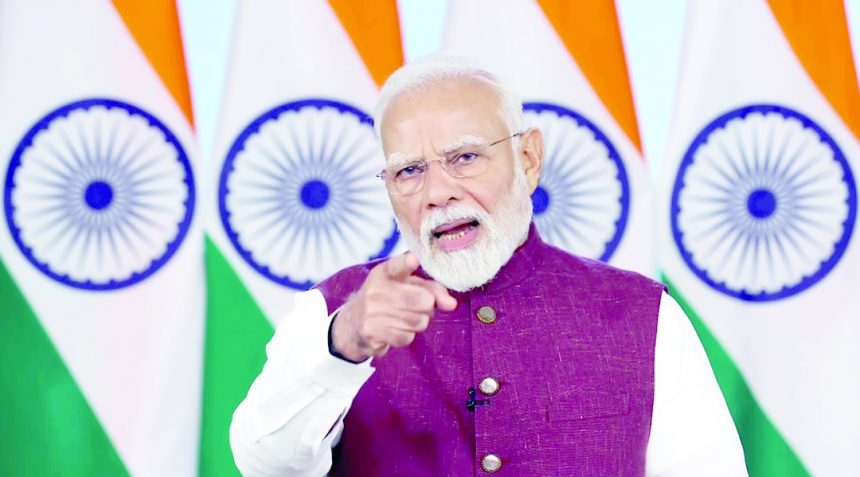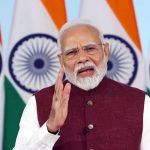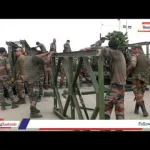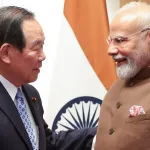Jammu, May 12: In a decisive address to the nation, Prime Minister Narendra Modi said that India has avenged the barbaric Pahalgam terror attack through “Operation Sindoor,” a bold military operation that dismantled terror infrastructure deep inside Pakistan. He made it clear that India will not tolerate any form of nuclear blackmail, asserting that while retaliatory operations have been temporarily paused, future actions will depend entirely on Pakistan’s behaviour.
The 22-minute address marked Modi’s first address to Nation since the launch of Operation Sindoor on May 7, India’s military response to the Pahalgam terror attack, which claimed the lives of 26 civilians, including 25 Indians and one Nepali national.
In his address, the Prime Minister described the April 22 Pahalgam attack — where innocent tourists were killed in front of their families after being asked their faith — as the “most barbaric face of terrorism.” Modi said the assault was not only a gruesome act of violence but a vile attempt to fracture India’s social harmony.
Expressing deep personal anguish, he said the attack was a national wound and that every Indian stood united in demanding justice.
The Prime Minister saluted the Indian Armed Forces, intelligence agencies, and scientists, crediting them with achieving the objectives of Operation Sindoor with extraordinary precision and discipline. He dedicated the mission’s success to “every mother, sister, and daughter of the country.” Modi noted that terrorists had dared to violate the dignity of Indian women, and India responded by destroying the very headquarters of terror.
Detailing the operation, Modi said that on the nights of May 6 and 7, Indian missiles and drones struck multiple terror camps and training centers across Pakistan, including in Bahawalpur and Muridke — locations long associated with global terrorist activities, including the 9/11 attacks and the London Tube bombings. Over 100 terrorists were eliminated, including several top handlers who had plotted attacks against India for decades. “Those who threatened India for years have been wiped out in one stroke,” Modi declared.
Modi also revealed that Pakistan, stunned by the scale and precision of India’s response, retaliated by targeting Indian civilian areas such as schools, temples, gurudwaras, and military bases. However, India’s advanced air defense systems neutralised the incoming missiles and drones. “Pakistan had prepared to strike at our borders. But India hit them at their core,” he said, adding that Pakistan’s airbases suffered extensive damage and its military confidence was shattered within three days.
By May 10, Pakistan was requesting de-escalation and contacted India’s Director General of Military Operations (DGMO), promising to halt all terror activities and cross-border aggression. Modi said India reviewed the situation and decided to temporarily pause its operations, but warned that this suspension is not permanent and Pakistan’s future conduct will determine India’s next steps. “We have just paused our retaliatory action. Every move by Pakistan will be closely watched,” he said.
In outlining India’s updated national security doctrine, the Prime Minister laid down a three-fold policy: Decisive retaliation to any terrorist act; zero tolerance for nuclear blackmail; and treating states that sponsor terror no differently than the terrorists themselves. He said Operation Sindoor is now India’s established response model, marking a strategic shift since the surgical strikes of 2016 and the Balakot airstrikes in 2019.
“I will tell world leaders too that this is our stated policy that if dialogue will occur, then it will be on terrorism and Pakistan-occupied-Kashmir,” he said, adding that terror sites targeted by India were also linked to the 9/11 terror attacks in the US and the London tube bombing.
Modi criticised the deep ties between Pakistan’s military and terrorist organisations, citing the attendance of senior Pakistani officers at the funerals of terrorists as proof of state-sponsored terror. He emphasised that India will no longer make a distinction between terror leaders and the regimes that protect them.
“Operation Sindoor,” Modi said, also showcased India’s dominance in both conventional and New Age warfare, including the use of drones and indigenously developed missile systems. He called the successful deployment of “Made in India” defense technology a watershed moment for India’s military capabilities and defense industry.
The Prime Minister made it unequivocally clear that India will not engage in dialogue under the threat of terror. “There can be no talks with terror. Terror and trade cannot run parallel. Blood and water cannot flow together,” he asserted, reiterating that any future negotiations with Pakistan will center solely on terrorism and the issue of Pakistan-Occupied Kashmir (PoK).
Addressing the world on the occasion of Buddha Purnima, Modi said that while this may not be an era of war, it cannot be an era of terrorism either. “Zero tolerance against terrorism is the guarantee of a safer, better world,” he stated, urging global unity against terror.
Concluding his address, Modi said Pakistan must dismantle its terror infrastructure if it wishes to avoid collapse. “Terrorism will be Pakistan’s downfall if it does not act,” he warned. “To preserve peace, India must remain strong—and when necessary, act with strength. That is what we have done.” The Prime Minister once again saluted the bravery of the Armed Forces and the unity and resolve of the Indian people.








